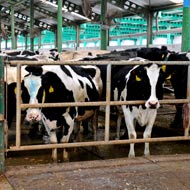
Value of thefts has risen by 20 per cent since 2012
Four major issues facing red meat producers have been highlighted in a new report published by the Food Standards Agency.
Written by the National Food Crime Unit, the Food Crime Annual Strategic Assessment identifies a wide range of vulnerabilities and risks across the food industry.
The report states that over the last twelve months, the misdescription and diversion of red meat are ‘areas of considerable concern..
It also summarises livestock theft, illegal slaughter and meat species substitution.
According to the NFU Mutual Rural Crime Survey 2015, over 90,000 animals were stolen in 2014.
It found that livestock is being stolen in greater quantities, with the value of thefts rising over 20 per cent since 2012. The financial loss for 2014 is estimated to be £7m.
The FSA say that it is highly likely the stolen livestock will be processed through illegal channels in order for the offenders to avoid detection. In turn, this presents food hygiene risks, given that the premises and practices used are unlikely to comply with food hygiene regulations.
Furthermore, the report states that the theft of animals without documentation will mean that the detection of those containing unauthorised veterinary medicine residues is impaired. This could lead to animals entering the food chain that are unfit for human consumption.
The National Food Crime Unit was established in December 2014 in response to the horsemeat scandal.
The incident cost the industry dearly, both financially and in terms of its reputation, and illustrated why enforcement agencies, regulators and food producers should work together to combat the threat of food crime.
“This is the first time we have had a law enforcement capability focused exclusively on food related crime,” commented Andy Morling, head of the NFCU.
“Working in partnership in this way ensures other agencies with a role to play in tackling food crime are not working in isolation. We've come a long way in our first year but this assessment makes clear that there is much more to be done.”
The Food Crime Annual Strategic Assessment can be found at: https://www.food.gov.uk



 The latest
The latest